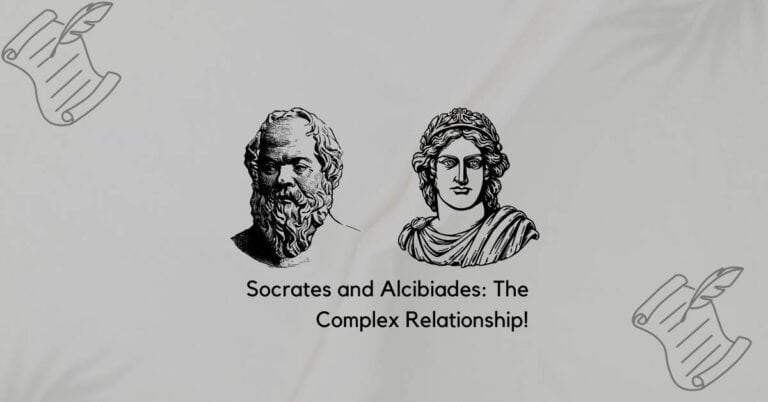Diotima’s Ladder of Love: From Lust to Morality!
“Love is a ladder we climb, rung by rung, towards the ultimate beauty,” said Diotima. Imagine a journey where each step reveals a deeper understanding of love and beauty. Intrigued? Let’s dive in.
Diotima’s Ladder of Love is a fascinating concept from Plato’s “Symposium.” It’s a philosophical journey from physical attraction to the love of pure, abstract beauty. Each step on this ladder represents a different kind of love, growing more profound as we ascend.
In this post, we’ll explore each step of Diotima’s Ladder of Love. We’ll see how it can enrich our understanding of love and beauty. By the end, you’ll have a fresh perspective on how love can elevate our lives.
The Historical Context of Diotima’s Ladder of Love:
Plato and the Symposium
Plato was a monumental figure in ancient Greek philosophy. His ideas and writings have profoundly influenced Western thought. Among his many works, “Symposium” holds a special place.
“Symposium” is more than just a philosophical dialogue; it’s a literary masterpiece. It captures a lively dinner party where guests, including Socrates, discuss the nature of love. Each speech offers a unique perspective, making the text a treasure trove of insights on love and beauty.
One of the most compelling speeches in “Symposium” is given by Aristophanes, the comic playwright. He presents a mythical and poetic view of love, suggesting that humans were originally spherical beings with four arms, four legs, and a single head with two faces.
According to Aristophanes, these beings were incredibly powerful and posed a threat to the gods. As a result, Zeus decided to split them in half, creating the humans we are today.
This separation left each person with a deep yearning to find their other half, their true counterpart, to feel whole again.
This speech beautifully encapsulates the idea that love is the pursuit of unity and wholeness, a profound longing to reconnect with our lost other half.
To further enhance our understanding of love in “Symposium,” let’s imagine a speech from a new character, a philosopher named Callista, who dives deep into the essence of love.
Callista’s Speech
Love, in its purest form, is the force that binds the universe together. It transcends mere physical attraction and penetrates the very soul. Love is the divine spark that ignites our passions, driving us to seek not just companionship but a profound connection that nourishes our spirit.
In our quest for love, we often encounter different forms of affection. There is the love of beauty, which draws us to the aesthetic pleasures of life.
This is the love of the artist, who sees beauty in the world and seeks to capture it in their work. There is the love of wisdom, or philosophia, which compels us to seek knowledge and understanding. This is the love of the philosopher, who is ever in pursuit of truth and enlightenment.
But beyond these, there is a higher form of love, one that transcends the physical and the intellectual. This is the love of the divine, the ultimate source of all love. It is a love that seeks the eternal, the unchanging truth that lies beyond the transient world.
This love is a journey towards self-realization, where we come to understand that we are not separate beings but part of a greater whole. In this realization, we find that true love is an expression of our unity with the cosmos, a reflection of the divine order.
As we navigate the complexities of love, let us remember that it is through love that we grow, that we transcend our limitations and become more than ourselves.
Love is not merely an emotion but a path to enlightenment, a way to connect with the divine and the eternal. In love, we find our purpose, our meaning, and our ultimate fulfillment.
Who was Diotima?
Diotima is a fascinating character introduced in “Symposium.” Though some debate her existence, her wisdom is undeniable. She is portrayed as a priestess and philosopher who enlightens Socrates about the essence of love.
Diotima’s contributions to the dialogue are profound. She introduces the concept of the Ladder of Love, illustrating how love evolves. From physical attraction to the love of pure, abstract beauty, each step on the ladder represents a deeper, more meaningful kind of love. Diotima’s teachings highlight how love can be a powerful force for personal and spiritual growth.
The Steps of Diotima’s Ladder:
Basic Concept of the Ladder
Think of love as a ladder. Each rung represents a deeper level of understanding and appreciation. This metaphorical ladder guides us from basic physical attraction to a profound love of pure beauty.
Diotima’s ladder starts with the simplest form of love. As we climb, our love becomes more intellectual and spiritual. It’s a journey that transforms our perception and deepens our connection to the essence of beauty.
The Individual Steps
Step 1: Love of a Single Beautiful Body
At the base of the ladder, we find physical attraction. This is where love begins for most people. Diotima explains that we start by loving one beautiful person. This initial attraction is often intense and focused on physical appearance. For instance, you see someone who captivates you with their looks, and you can’t help but be drawn to them. This step is essential because it ignites the desire that drives us to seek deeper forms of love.
Step 2: Love of All Beautiful Bodies
As we climb to the next rung, our love expands. Diotima suggests that after appreciating one beautiful body, we begin to see beauty in many others. This step teaches us that beauty is not unique to a single person. It’s a common quality that can be found in many people. We learn to appreciate the diversity of physical beauty around us. This broader perspective helps us understand that beauty is a universal attribute, not confined to one individual.
Step 3: Love of Beautiful Souls
Now, love has become more profound. Diotima explains that we start to value the inner beauty of people—their kindness, wisdom, and character. This step marks a significant shift from physical attraction to a deeper appreciation of someone’s personality and virtues. For example, you might admire someone’s generosity or integrity. This form of love is more stable and enduring because it focuses on qualities that go beyond physical appearance.
Step 4: Love of Beautiful Laws and Institutions
Moving higher, love takes on a social dimension. Diotima teaches that we begin to appreciate the beauty in good laws and institutions that promote justice and harmony. This step involves understanding and valuing the structures that make society function well. Imagine admiring the fairness of a well-functioning justice system or the benefits of educational institutions. This love is about seeing the bigger picture and recognizing the importance of collective well-being.
Step 5: Love of Knowledge
At this stage, intellectual beauty captivates you. Diotima believes that after appreciating the beauty in individuals and institutions, we fall in love with the pursuit of knowledge and wisdom. It’s the joy of learning and understanding complex ideas. Think of the thrill you get from a fascinating book or a brilliant idea. This step represents a love for truth and intellectual discovery, which brings a higher level of fulfillment and enlightenment.
Step 6: Love of Beauty itself (the Form of Beauty)
At the top of the ladder, we find the purest form of love. Diotima describes this as the love of absolute beauty beyond any physical or intellectual form. This is a profound, almost spiritual experience where we appreciate beauty in its most abstract and perfect form. It’s about loving the very essence of beauty itself, detached from any specific object or person. This step represents the ultimate goal of Diotima’s Ladder—reaching a state of complete and pure love that transcends all earthly forms.
Philosophical Implications:
Role of Love in Human Development
Diotima’s Ladder of Love isn’t just about romantic relationships. It’s a roadmap for personal growth and intellectual development. Each step on the ladder represents a deeper, more meaningful connection, encouraging us to evolve.
In the beginning, our love is simple and based on physical attraction. But as we climb, we learn to appreciate deeper qualities in others. This teaches us empathy and understanding. By loving beautiful souls, we develop virtues like kindness and integrity.
As we move higher, our love extends to society. Appreciating beautiful laws and institutions helps us become better citizens. It encourages us to support justice and harmony. This broadens our perspective and deepens our sense of responsibility.
Finally, the love of knowledge and the Form of Beauty fosters intellectual growth. We become seekers of truth and wisdom. This ultimate stage promotes a lifelong pursuit of learning and self-improvement. Diotima’s ladder shows how love can guide us to become wiser, more compassionate individuals.
The Pursuit of True Beauty
The ultimate goal of Diotima’s Ladder is reaching the Form of Beauty. This is the pinnacle of love, where we appreciate beauty in its purest form. It’s not about physical or even intellectual beauty anymore. It’s about a profound, almost spiritual appreciation of beauty itself.
In Platonic philosophy, this idea is central. Plato believed in the existence of perfect Forms—abstract, ideal versions of things we see in the physical world. The Form of Beauty is one such ideal. It’s the perfect essence of beauty beyond any specific example.
Reaching this stage means we transcend earthly attachments. We start to see beauty in everything, in a way that’s deeply fulfilling. This pursuit aligns with Plato’s idea that true knowledge and understanding come from recognizing these Forms.
In essence, Diotima’s Ladder of Love guides us toward a deeper, more meaningful existence. It shows how love, in its highest form, can lead us to profound truths about ourselves and the world around us. By climbing this ladder, we not only find greater personal fulfillment but also contribute to the betterment of society.
Practical Applications of Diotima’s Ladder in Modern Life:
Personal Relationships
Understanding Diotima’s Ladder can transform how we view our relationships. At the base, physical attraction is essential, but it’s just the beginning. Recognizing this can prevent us from getting stuck on superficial qualities.
As we move up the ladder, we start valuing deeper aspects of our partners. We appreciate their virtues and inner beauty. This shift can lead to more meaningful and lasting relationships. For example, focusing on kindness and integrity strengthens emotional bonds.
Moreover, understanding that love extends beyond physical attraction helps us build healthier relationships. It encourages us to seek partners who enrich our lives on multiple levels, fostering a deeper connection.
Professional and Creative Pursuits
Diotima’s ladder isn’t limited to personal life; it applies to professional and creative endeavors, too. Appreciating beauty in knowledge can drive us to excel in our fields. It encourages lifelong learning and intellectual growth.
In creative pursuits, this concept can be especially powerful. Artists, writers, and innovators often seek beauty in their work. Understanding the ladder helps them strive for higher levels of creativity and expression. It’s about finding inspiration in the pursuit of excellence.
Moreover, recognizing the beauty in laws and institutions can guide professionals in making ethical decisions. It promotes a sense of responsibility and integrity, essential for long-term success and fulfillment.
Self-Improvement and Inner Growth
Using the ladder as a guide for self-improvement can lead to profound inner growth. Each step encourages us to look beyond immediate gratification and seek deeper truths. It starts with appreciating physical beauty but quickly moves to valuing inner qualities.
This journey fosters empathy, compassion, and wisdom. By loving beautiful souls, we become more virtuous ourselves. By appreciating knowledge, we become wiser. The ultimate goal, the love of the Form of Beauty, leads to a more enlightened and fulfilling life.
In essence, Diotima’s Ladder is a roadmap for personal and spiritual development. It helps us grow into better, more complete individuals.
Criticisms and Alternative Interpretations:
Criticisms of Diotima’s Ladder
Diotima’s ladder, while profound, isn’t without its critics. Some argue that it’s overly idealistic. They question whether such a structured progression of love is realistic in everyday life.
Others point out that the ladder might be too abstract. The steps from physical attraction to the love of beauty in its purest form can seem disconnected from real-life experiences. Critics argue that love is more complex and less linear than Diotima suggests.
Additionally, some philosophers debate whether the ladder places too much emphasis on intellectual and spiritual aspects of love, potentially undervaluing physical and emotional dimensions.
Alternative Interpretations
Despite these criticisms, the Ladder of Love has inspired many alternative interpretations. Some modern philosophers view it as a metaphor for personal growth rather than a strict progression. They suggest that the ladder’s steps represent different dimensions of love that can be experienced simultaneously.
Others interpret the ladder as a guide for cultivating a balanced view of love. This perspective encourages individuals to appreciate physical beauty while also valuing deeper qualities. It promotes a holistic approach to understanding love.
In contemporary philosophy, some see the ladder as a way to explore the connections between love, knowledge, and virtue. They argue that Diotima’s teachings highlight the transformative power of love in all areas of life.
Overall, while Diotima’s Ladder may have its critics, it continues to be a valuable framework for exploring the nature of love. Its principles can be adapted and applied in various ways, offering insights into personal development and human relationships.
Conclusion:
Diotima’s Ladder of Love offers a profound and insightful journey through the stages of love. Starting from the basic physical attraction, it leads us to a deeper understanding and appreciation of beauty in its purest form. This metaphorical ladder isn’t just a philosophical concept; it’s a guide for personal growth and self-improvement.
Understanding each step on the ladder can transform our relationships, both personal and professional. By valuing the inner qualities of others and appreciating the beauty in knowledge and institutions, we become more empathetic, wise, and ethical individuals. Diotima’s teachings remind us that love is a powerful force that can elevate our lives and help us strive for higher truths.
While Diotima’s Ladder has faced criticisms and sparked philosophical debates, its core principles remain relevant. It encourages us to look beyond superficial attractions and seek deeper connections. The ladder’s ultimate goal, the love of the Form of Beauty, inspires us to pursue a more meaningful and enlightened existence.
Incorporating the concepts of Diotima’s Ladder into our lives can lead to richer, more fulfilling experiences. It shows us that love, in its highest form, is not just about personal satisfaction but about reaching a state of complete and pure appreciation of beauty. As we climb this ladder, we not only discover more about the world around us but also about ourselves.
By understanding and applying Diotima’s Ladder of Love, we can embark on a journey that transforms our understanding of love and beauty, enriching our lives in profound ways.



